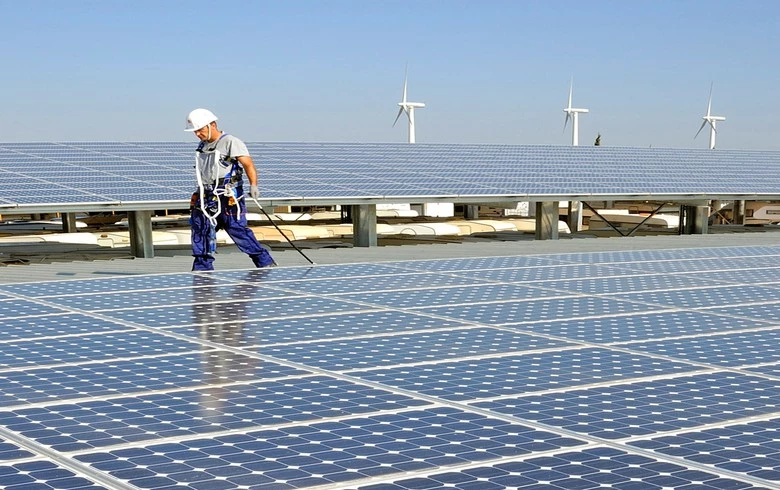Tunisia’s real Gross Domestic Product (GDP) growth rate could reach 2.8% in 2018 and 3.5% in 2019. However, this upward trend “still remains weak,” said Assitan Diarra-Thououne, regional economist for Africa. from the North to the African Development Bank (AfDB), presenting Monday the report on the “Economic Outlook for Africa 2018”, dedicated to North Africa.
“This achievement is conditional on an acceleration of structural reforms, a rise of the industrial apparatus to meet external demand and the mitigation of the cyclical nature of the growth of the agricultural sector,” the report on the African Economic Outlook 2018 dedicated to North Africa and covering Algeria, Egypt, Libya, Morocco, Mauritania and Tunisia, reads.
According to the report, achieving the expected growth rates will depend on the country’s capacity to consolidate and continue growth, particularly in the manufacturing and non-manufacturing industries (phosphate, oil and gas) and market services.
The report shows that several positive factors should support Tunisia’s growth in 2017 and then in 2018-19. The security policy introduced after the 2015 attacks has clearly borne fruit, especially with regard to tourism, with an increase in tourist flows of 32% in 2017, which should improve the balance of payments and help stabilise the dinar.
Phosphate production and exports have rebounded strongly and investment (both foreign and domestic) is starting to show signs of recovery. Tunisia also continues to enjoy strong support from the international community. Growth should also benefit from the continued recovery in the euro zone, which began in 2012, particularly in Spain, Germany and France, and is expected to drive exports up.
Finally, Tunisia could also benefit from the dividends of certain strategic reforms adopted since 2015, such as the law of 27 November 2015 on public-private partnerships and that of 30 September 2016 on investment aimed at boosting the investment rate, in line with the 2016-2020 Development Plan, a rate that increased from 19% of GDP in 2016 to 24% by 2020.
In return, the report cited the negative factors, indicating to this effect that since 2011, the country’s public accounts have continued to deteriorate. Dominated by current expenditure (72% of the budget in 2017), public expenditure does not correspond to investment needs, especially in infrastructure. Despite some progress, the progress of structural reforms initiated since 2013 remains limited because of the resistance to change in the development model that has accompanied the Tunisian economy since the 1970s.
The acceleration of reforms remains essential for Tunisia to continue to benefit from the support of development partners and from the confidence of the markets for the financing of its debt. Other negative medium-term factors are a deterioration in security due to the Libyan crisis and a possible resurgence of social conflicts related to public sector reform and the deterioration of purchasing power. Macroeconomic vulnerabilities have worsened.
Public debt was estimated at 70 percent of GDP at the end of 2017, the current account shows a double-digit deficit, and the central bank’s foreign reserves have declined. In addition, the 2018 Finance Act aims to reduce the budget deficit to less than 5% of GDP, but this ambitious goal will not be easy to achieve. The state’s fiscal strategy and a comprehensive reform of the civil service will have to be implemented. A reduction in energy subsidies, which disproportionately benefit the wealthiest, and the pursuit of social security reform can help stabilise public deficits and debt.
Another major challenge for the coming years is to remove the main obstacles to growth and job creation – in particular by simplifying the regulatory framework to solve the problems of non-performing loans and governance of public banks, and thus broaden access of small and medium-sized enterprises (SMEs) to bank financing. Tunisia could also adopt a plan to stimulate new industries with high competitive potential that could absorb the country’s vast pool of underemployed skilled workers.
Development, Investment and International Cooperation Minister Zied Laâdhari, who attended the launch of the report, stressed the need to move towards the African market to further strengthen trade and economic cooperation which is a strategic choice for the country. The African economy is a vital economy and will be more dynamic in the coming years, especially as global growth will be driven mainly from the African continent.
For his part Mohamed El Azizi, AfDB Director General for the North Africa Region said that the bank’s strategy in Tunisia is to focus on the industrial sectors, especially in the interior regions, to promote the creation of jobs
TunisianMonitorOnline (Source : TAP)




